|
| Conrad, Sydney Fitzgerald Oonah Stuart & Mgr Scale |
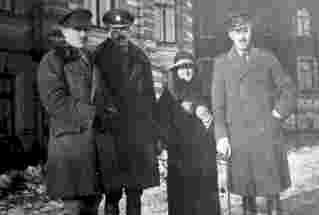
|
The real
business of life as a secret agent was not quite the glamorous cloak and dagger
stuff Conrad had imagined. He had a codename though, he was - ST.36 (ST for Stockholm). Soon he was busy reading files
and compiling and filing intelligence reports for dispatch via diplomatic bag,
and getting to know the lay of the land. The territorial wrangling, the claim
and counter claim of the Russian, Finnish and German contingents prefigure the
tensions which were to lead Europe into another war. Conrad met many of the main principal
players in the unfolding political drama in the Baltic
states, including Maxim Litvinoff,
the Bolshevik-appointed Representative to the Court of St James. Litvinoff’s
subversive activities while in that role were to lead to the creation of a new
MI5. Thus was formalised an intelligence approach which characterised Cold War
counter-espionage organisations for a generation. Conrad also met the Finnish
General, Mannerheim, and
the White Russian
Generals, Yudenich and Gulkevitch.
Mannerheim had served in the Imperial Russian Army, but after the Revolution,
he acted as the Commander of the White Army during the Finnish Civil War of
1918. Another in this intelligence circle was Vidkun Quisling. Then a
major in the Norwegian army. Quisling’s work within group led to him becoming
central to the work of Fritjof Nansen of Nansen Passport fame
during the Russian
Famine of 1921.
The
British agents he worked with included the diplomat Bruce Lockhart.
Lockhart’s subversive activities, in cahoots with Sidney Riley – ST.1 –
when he was Acting British Consul-General in Moscow during the
Revolution, had seen him imprisoned and under sentence of death after an
attempt on Lenin’s life. Recent research also implicates him in the assassination of
Rasputin. Conrad’s boss Major John Scale too played a part in Rasputin’s
demise. Another of Lockhart's contacts
whom Conrad knew was Arthur
Ransome – ST.76 – the author of Swallows and Amazons. He was the only
Western journalist allowed by the Soviets to meet and interview the leaders of
the Revolution, including Lenin. His cover was that of a Soviet sympathizer,
and his many articles reflected this to the point where there were moves back
in Britain to
have him censured. His
love affair with Evgenia Schelepina, Leon
Trotsky's secretary, had further
drawn him into espionage in post-revolutionary Russia.
Conrad also met Lieutenant
Agar – ST.37 – who won a VC for
sinking the battleship Oleg in top-secret high-powered torpedo boats. Agar was
recruited by C and sent to Finland to extract another operative, Paul Dukes - ST25 -, who was
their principal agent in Russia. Despite running the gauntlet
through Soviet held forts a number times, it was never to happen. Instead, he
ended up leading a clandestine attack using these boats and effectively
disabled the Communist fleet while at anchor. Paul Dukes was the perfect spy.
He had lived in Tsarist Russia as a boy. He spoke the language like a native.
He was intelligent, courageous and good-looking. A master of disguise, he
infiltrated the St Petersburg Communist party and attended meetings and
compiled reports for C. Paul Dukes made his mark in espionage history; later
that year he was knighted for services to the Nation. Conrad was in the centre
of things. He was the agent who took these raw reports and sent them to London and also distributed the
intelligence gained to the various interested parties of the Allied camp.
Cummings and Menzies had presented him with a supporting role to the very first
Cold War spies.
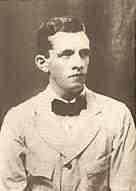
|
| Bruce Lockhart 1909 |
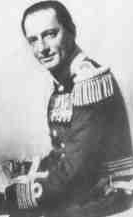
|
| Augustus Agar |
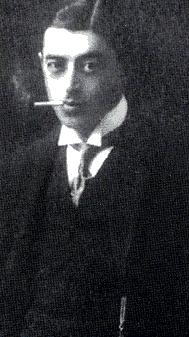
|
| Sidney Riley 1989 |

|
| Arthur Randsome |
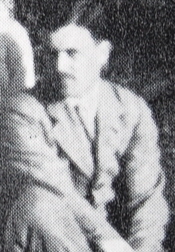
|
| Conrad ffrench 1919 |
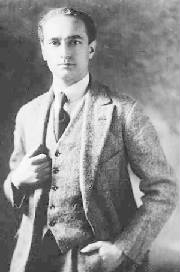
|
| Paul Dukes |
The actual duties of an assistant
military attaché were varied. Conrad relates an amusing tale concerning two demobilised British flying officers who brought
with them two Avro planes. They coaxed him into the passenger seat of one of the planes and Conrad experienced flying for
the first time in a spectacular acrobatic display, which left poor Conrad much the worse for his little flight. A
few months later, this intrepid pair caused a minor diplomatic problem for Conrad when a flotilla of new flying boats visited
the Swedish capital on a propaganda mission. It was advertised they would fly under the bridge spanning
a deep canyon nearStockholm. On the day, however, they decided wind conditions
were not ideal and so cancelled the fly through. After a lengthy wait, the gathered crowds became
tense with frustration. Then all eyes fixed on two approaching specks – the Avro's. They zoomed into view, to the crowd’s
delight. Not content with flying under the bridge, they also looped the loop around the bridge before
flying off and disappearing as quickly as they had come. It fell to Conrad to smooth the ruffled diplomatic feathers that
the intrepid pilots had stirred with their timely display. The crowd, though, were well pleased with the spectacle. With Finland in a state of war with the Soviets, the focus of the political drama had moved from Stockholm to Finland. Accordingly, Major Scale’s office decamped
there in 1920. Conrad's new base was Helsingfors (Helsinki).
The White Russians’ offensive against the Communists has all but collapsed, primarily through lack of support from the
Allies, who did not trust them, and Finland had declared
independence after a bloody Civil War. Following Britain's recognition
of the new Finnish state, Lord Acton was sent to Helsingfors as Minister Plenipotentiary. Actonwas perceived
as being of German descent, despite his British credentials. Although he was an astute farsighted political
thinker, his diplomatic skills left something to be desired. His first public speech was at a banquet
in his honour. He chose to air his views on the inevitability of communism. The
papers were furious! Lord Acton kept to his house, but on 27 February shots were fired as he crossed the street in Helsingfors. There
were other such instances. Finland's burgeoning independence was threatened by the growth of Communist Russia,
and though the Finns knew this, they were indignant at Lord Acton's presumption. A month later, he
was withdrawn.
| Next Page |

|
|









